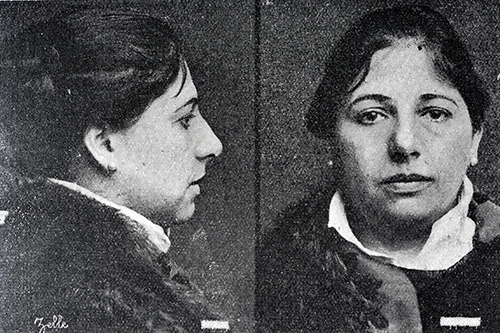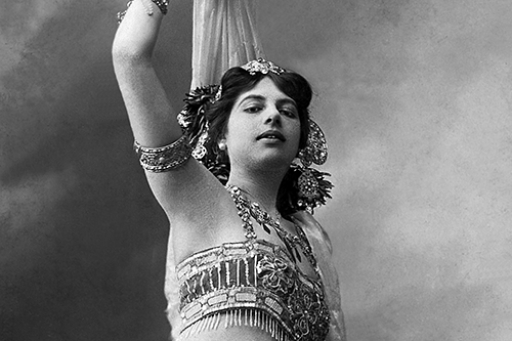100 years after Mata Hari’s execution for spying, there’s an opportunity to hear expert reassessments of her notorious reputation at an international symposium taking place in London.
Mata Hari was the stage name of Margaretha Zelle, an exotic dancer condemned to death in France on charges of passing secrets to Germany at the height of the First World War.
Aged 41, she was shot by firing squad near Paris on 15 October 1917. Her name has been synonymous with seduction and betrayal ever since.
The centenary conference at City, University of London on October 28 promises new insights into Mata Hari’s life and death, drawing on recently discovered sources.
It’s organised by Dr Julie Wheelwright, who’s been researching the Dutch-born dancer and courtesan for more than 25 years.
 Police photo of Mata Hari, 1917. A century later, there are suggestions that she was a convenient scapegoat for French military failures in the Great War (Photo: Museum of Friesland Collection, Leeuwarden)
Police photo of Mata Hari, 1917. A century later, there are suggestions that she was a convenient scapegoat for French military failures in the Great War (Photo: Museum of Friesland Collection, Leeuwarden)
Dr Wheelwright says: “For 100 years Mata Hari has fascinated people around the world, prompting enticing myths about a life of seduction and espionage.
“Despite her global fame and iconic status, many aspects of her life, including her espionage activities and her role as a mother, have remained a mystery. But now with newly discovered letters and intelligence documents, we can begin to complete the picture of her character, her motives and the meaning of her story.
“The centenary of Mata Hari’s execution also provides a unique opportunity to examine her legacy and explore the links between anxieties about female sexual and national betrayal.
“This symposium will bring together a fantastic set of experts, who will shine a light on the realities and myths of women in espionage.”
Guest speakers include Dutch journalist Hanneke Boonstra. She’s written a series of blogs in the run-up to a special exhibition opening on October 14 at the Museum of Friesland in Leeuwarden, Mata Hari’s hometown in the Netherlands.
‘The Legacy of Mata Hari: Women and Transgression’ takes place at City, University of London on Saturday 28 October 2017. Admission is free but booking is essential. The deadline for registration is October 25, or when all places are filled. More details about the conference can found here.
‘Mata Hari, the myth and the maiden’ is at the Museum of Friesland, Leeuwarden, from 14 October 2017 to 2 April 2018. Exhibits include personal possessions, photographs, scrapbooks, letters and military files – some of which have never been shared with the public until now. Dr Julie Wheelwright will be speaking at the museum on October 15, the centenary of Mata Hari’s execution.
Source: City, University of London
Images courtesy of Museum of Friesland Collection, Leeuwarden
Posted by: CN Editorial Team
